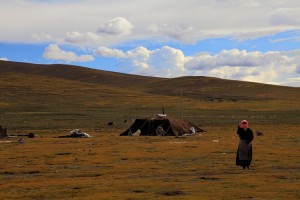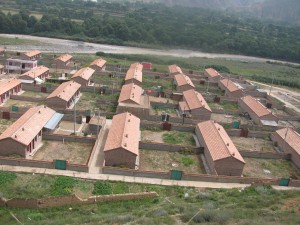A group of Tibetan nomads in north west China’s Quinghai province have refused to move from their traditional pasture lands on the Tibetan plateau to resettlement towns. As a result the authorities have confiscated their residency permits and ID as a punishment. Criticising the nomads’ refusal to move Chinese officials rebuked them, citing “disobedience” and “noncompliance with central government policy”.
On November 1, ten Tibetans from Dzamar village went to Domda township to ask the officials to return their documents. Their request was refused and they were asked to pay a fine of 10,000 yuan (US$ 1,600, over GB £1,000 ). The Tibetan representatives said they could not pay. In previous cases elsewhere, some of those who have protested against resettlement have been arrested and sentenced to long jail terms.
As part of the Chinese resettlement project there is a policy to move nomads to new towns being built in urban areas as well as remote and inaccessible areas. Nomadic herders range across the Tibetan plateau, using their intimate knowledge of the landscape to find the best grazing for their animals and sustain their families and communities. Since the early 1990s, China has sought to destroy this way of life and nomads are now banned from grazing their animals on some of the best fertile grasslands, especially in Yulshul and Golug. While the Chinese government claims that they are moving the nomads because nomadic grazing practices damage the Tibetan plateau’s environment, it is widely understood that this land will be used for mining and the exploitation of rich mineral resources.
Last year 200 nomads from the Domda area were moved to resettlement towns. It was reported by Radio Free Asia that housing conditions were very bad. The concrete houses are built very close together and are very cold in winter, and the townships do not have adequate schools or health clinics. Although the Chinese policy says that nomads should receive vocational training, in reality there is little taking place. There are few opportunities to enter the modern economy. Some make a living by opening a local shop and selling basic goods to other resettlers, others, mostly young adults, find casual low paid work in urban areas. A lot live in poverty and turn to alcohol and drug misuse.
The Tibetan Centre for Human Rights and Democracy has reported that the nomads, or drogpas, are suffering eight losses: loss of independent livelihood; loss of unity and solidarity; loss of culture of decency and respect; loss of a unique livelihood; loss of ancestral homelands; loss of drogpa folk culture; loss of culture of shame and modesty and loss of drogpa humanity. Over 2 million nomads have been forcibly relocated since 2006. It is the Chinese policy to resettle all nomads by 2015. It is one of the greatest expulsions of a people from their land in history.






 Print
Print Email
Email